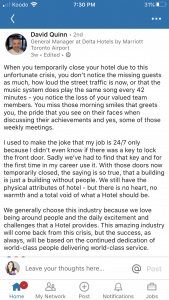#hospitalitystrong
Light it up Purple!
The hospitality industry has been decimated. Closures due to Covid-19 have resulted in millions out of work. There is no firm end in sight. Social distancing measures are set to ease, but there is a strong belief that the hospitality sector will be one of the last industries to see restrictions lifted and/or amended. While the degree of government intervention is well-advised, it doesn’t change the fact that there are many hospitality workers out of work and looking at an insecure future.
Travel and tourism are social behaviours that are unlikely to re-bound as quickly as sectors such as Health and Education. While it’s easy to say “tourism is not essential”, the industry employs 1.8 million workers in Canada, over 50% of whom work in Food & Beverage services1. It also contributes over $102B1 to the economy annually in Canada. Even while imposing social distancing restrictions, governments have been reluctant to fully close restaurants, allowing take out services to continue and easing restrictions on alcohol sales. Food service is an essential service.
The hotel industry in Canada saw occupancy dive 81% to 12%2 nationwide the first full week of April. To give some context, hotels typically become profitable around 60% occupancy and are generally at their most profitable between 75%-85% occupancy. Hotels in Canada are like ghost towns. And that is even as governments seek the essential service of accommodations partners to house health care workers, the homeless and other at-risk populations during the Covid-19 crisis.
According to the Tourism Industry Association of Canada1, from April 1 to April 6, 2020:
- 59 per cent of tourism businesses are closed temporarily.
- More than 21 per cent are at risk of closing permanently in three months’ time.
- Nearly 59 per cent are at risk of closing temporarily in 3 months’ time.
- 38 per cent of tourism businesses have laid off staff, and of those 42 per cent have laid off up to 100 per cent of their staff.
Travel and Tourism employees are some of the most vulnerable. They rely on tips to boost their incomes, and because tipped workers make a lower minimum wage, they are eligible for less Employment Insurance. In addition, many hospitality workers are students and immigrants, making them ineligible or eligible for reduced government support. The Canada Emergency Response Benefit and recently-announced funding that benefits students helps, but it hardly replaces the incomes these workers lost.
There are signs of emergency measures being lifted, but it is far from clear to what extent. The Water Tower Inn expects, after much research, that the return to travel will be slow. In addition, it is highly likely that continued capacity limitations in restaurants will impact the level of possible business once they do re-open. Finally, there is a strong belief among epidemiologists that Covid will resurface in the Fall, potentially leading to stricter social distancing measures once again.
So what does this all mean for hospitality workers?
It means that their jobs are precarious. When things begin to return to “normal”, hours and customers may not be there to provide the incomes they were used to before the pandemic. As it stands now, the re-opening of their places of work is also likely to coincide with the planned termination of CERB support.
The Inn has not been immune to temporary layoffs and the management team is constantly discussing this conundrum. Our team is our beating heart, and to have them in such a precarious situation is worrisome.
To recognize the situation of the many hospitality workers, we are lighting the tower purple until May 3rd. We hope that you, too, will light up purple to remember our hospitality family. #hospitalitystrong

This was posted by the GM of the Delta by Marriott Toronto Airport after closing the doors in early April.
1Tourism Industry Association of Canada (TIAC), https://tiac-aitc.ca/
2Canadian Hotel Industry Reports Steep Year-over-year Declines, Hotel News Resource, April 16, 2020, www.hotelnewsresource.com